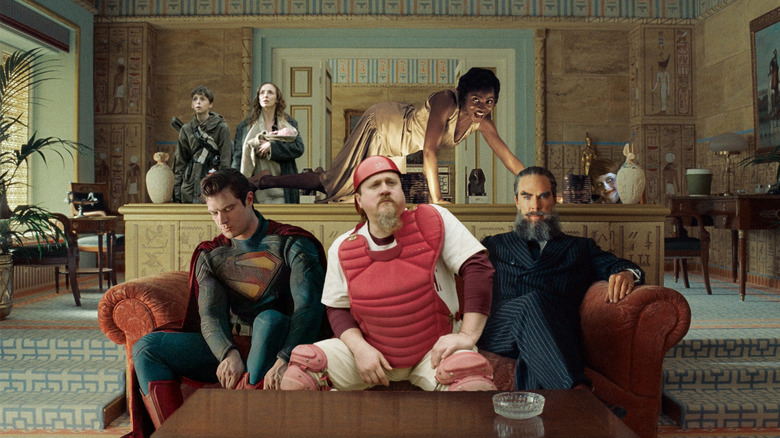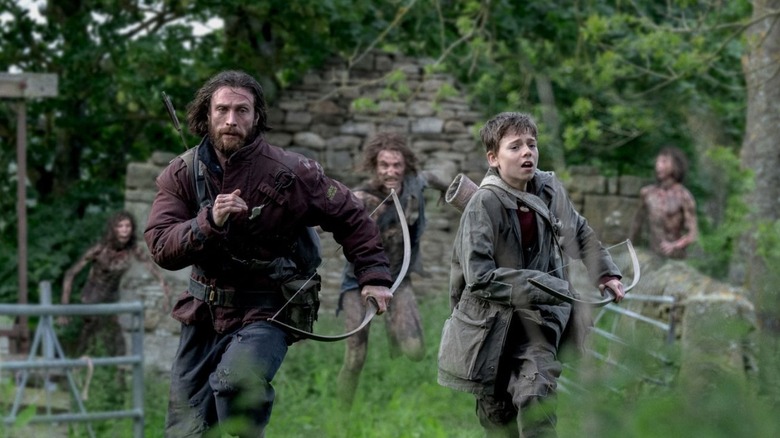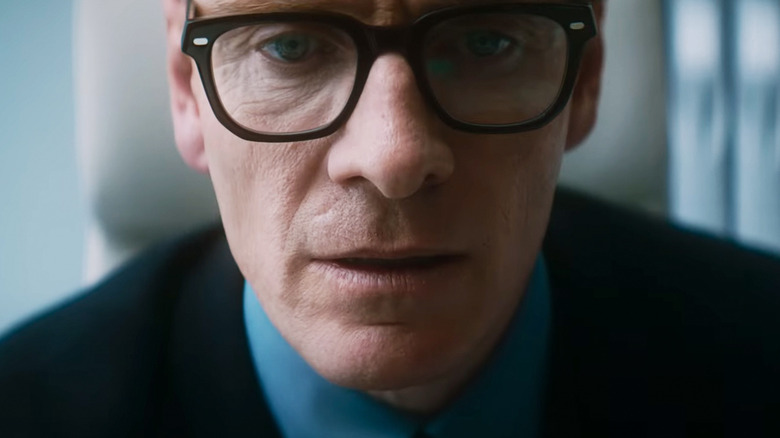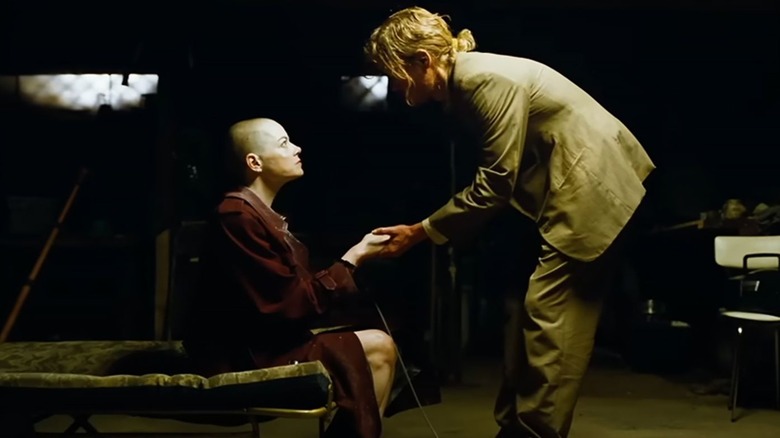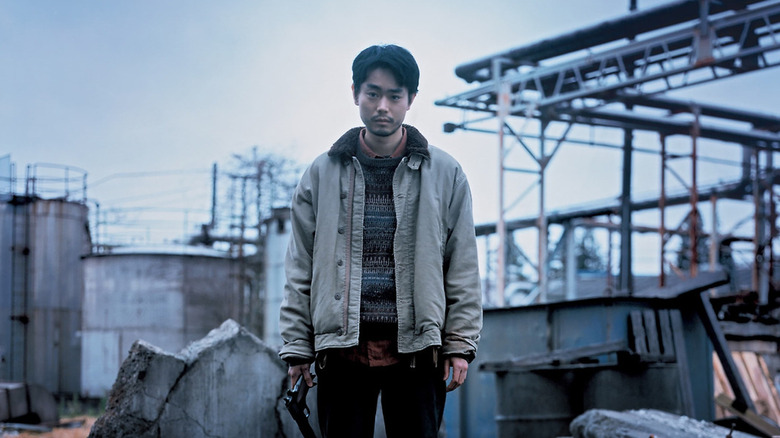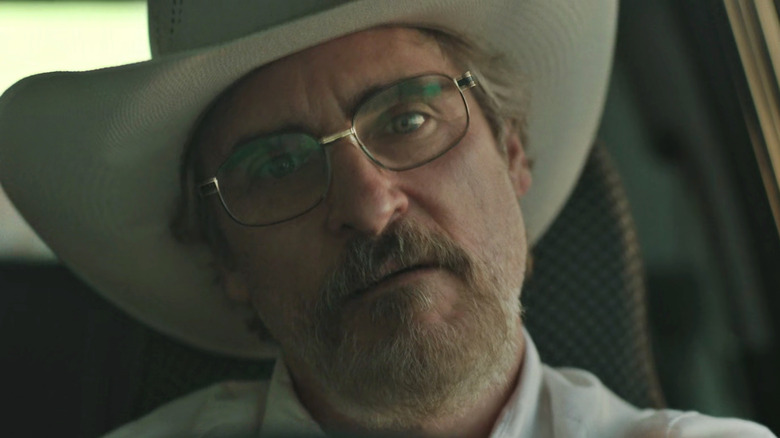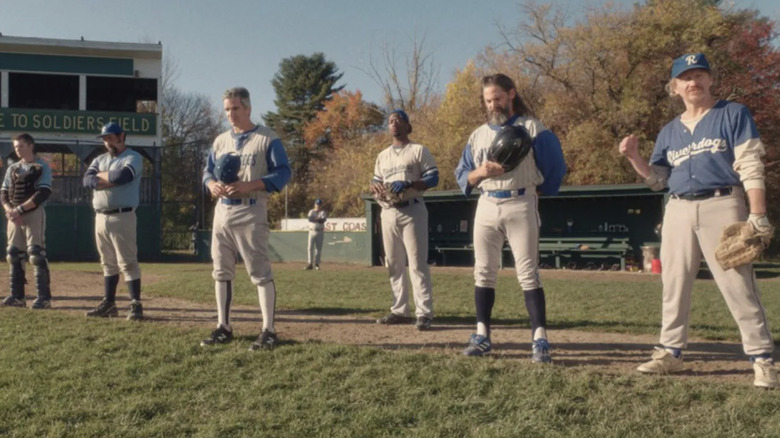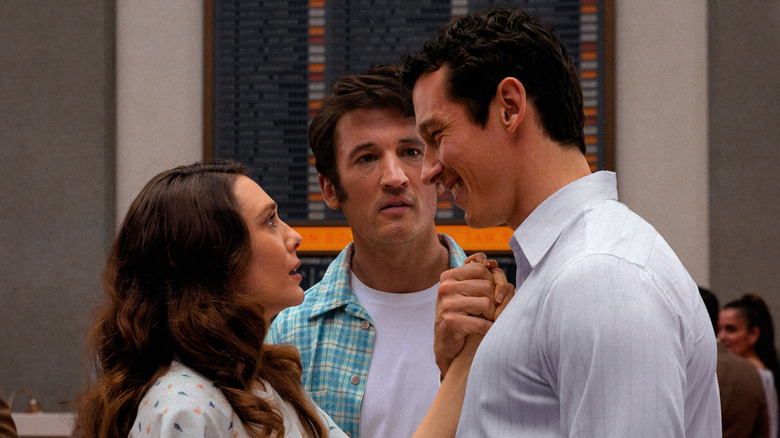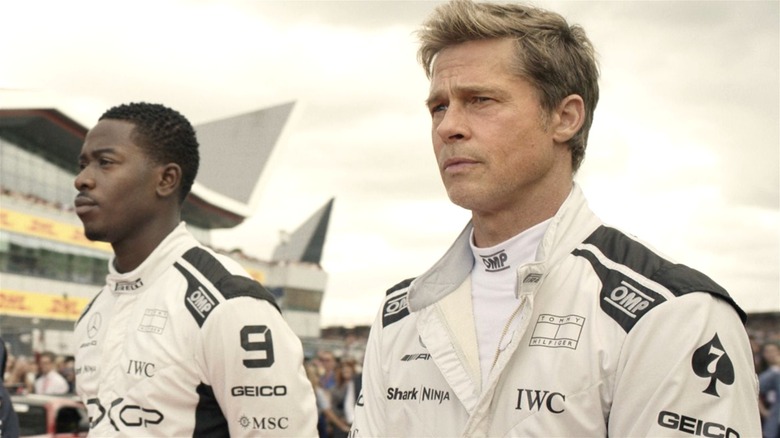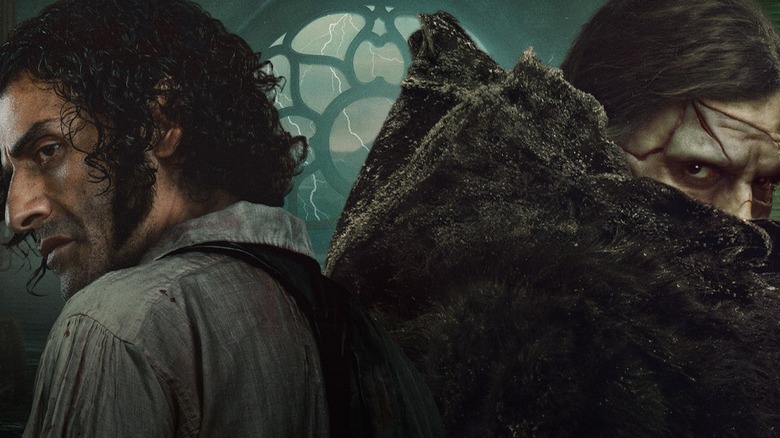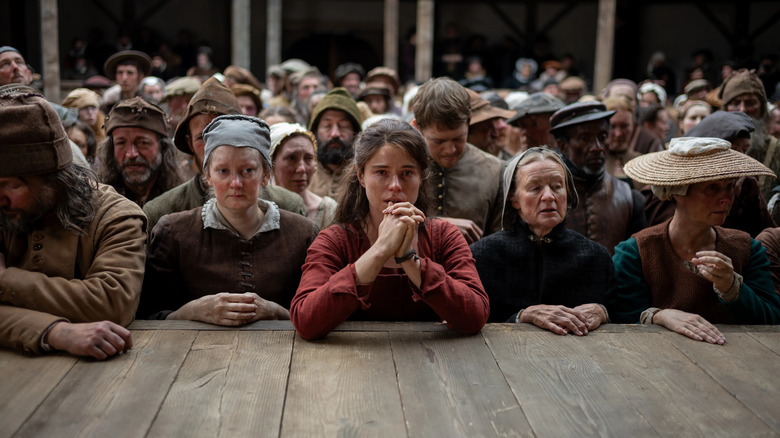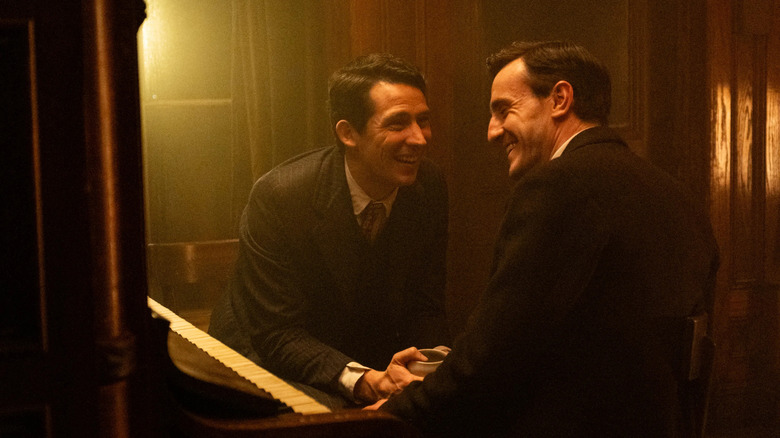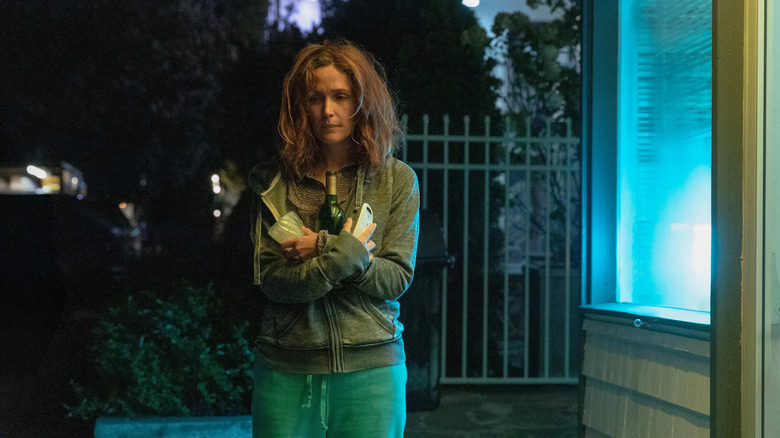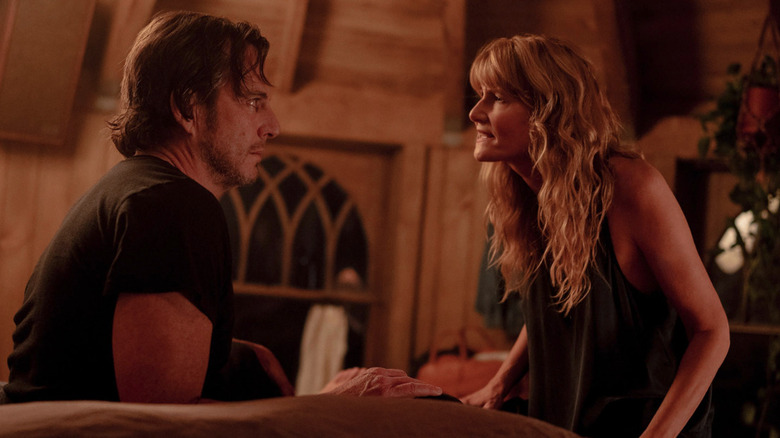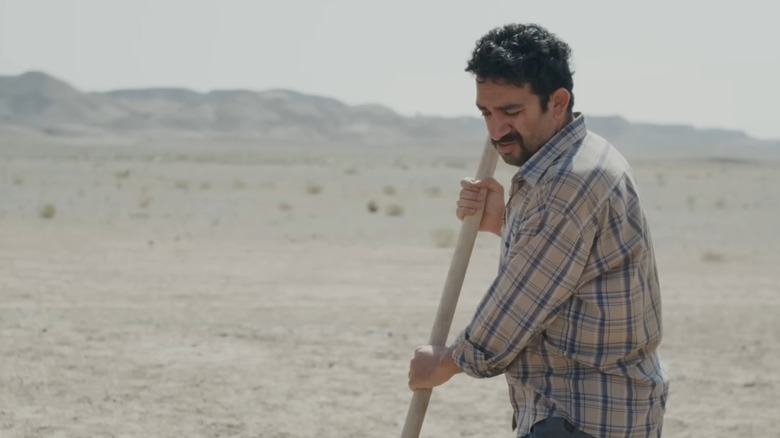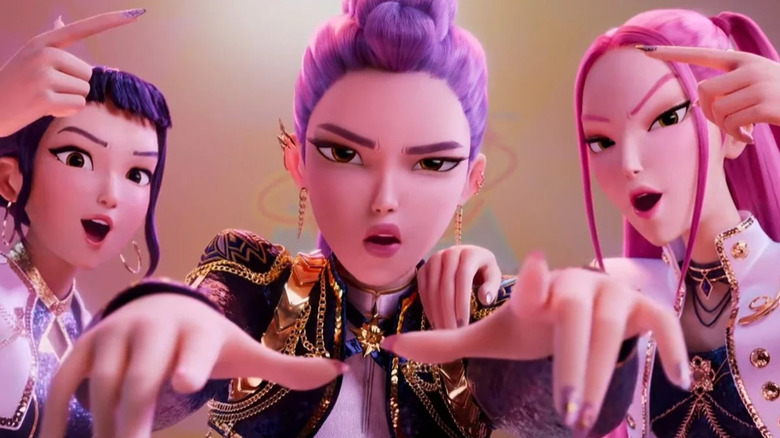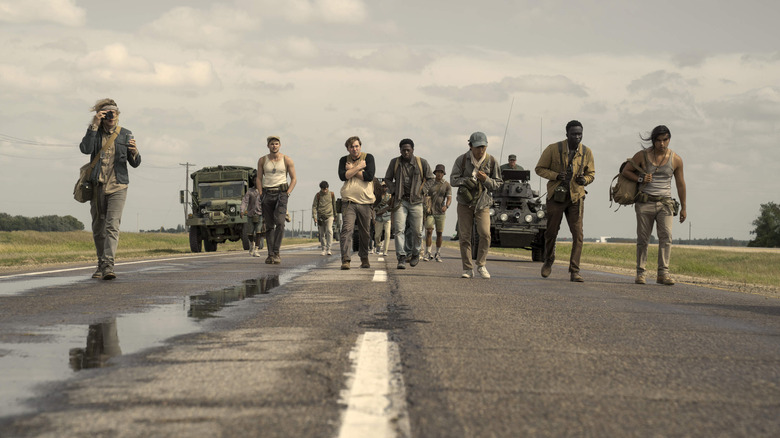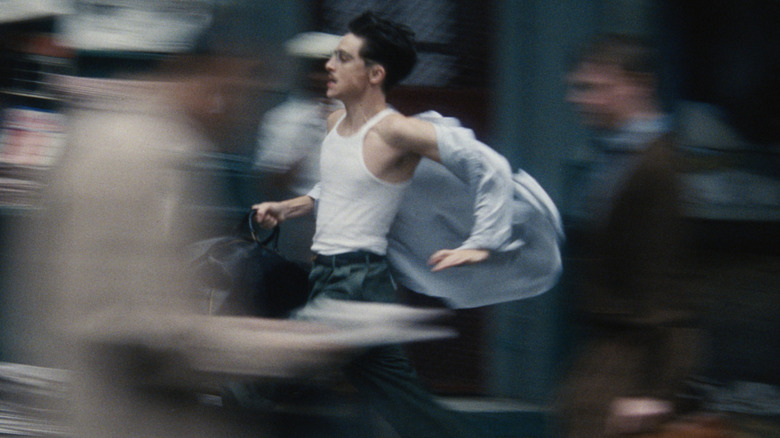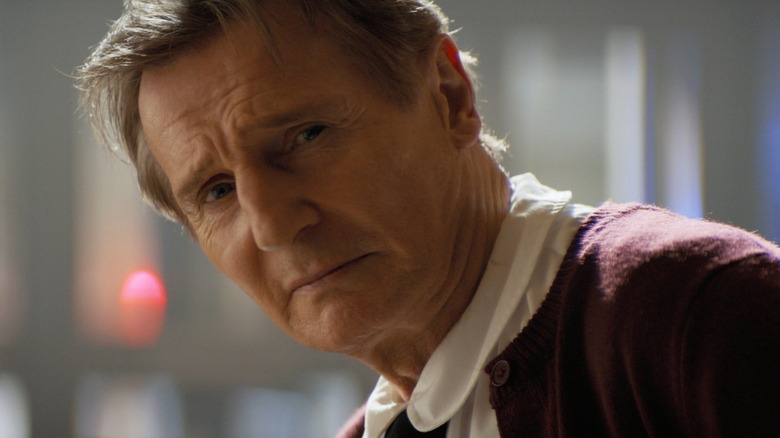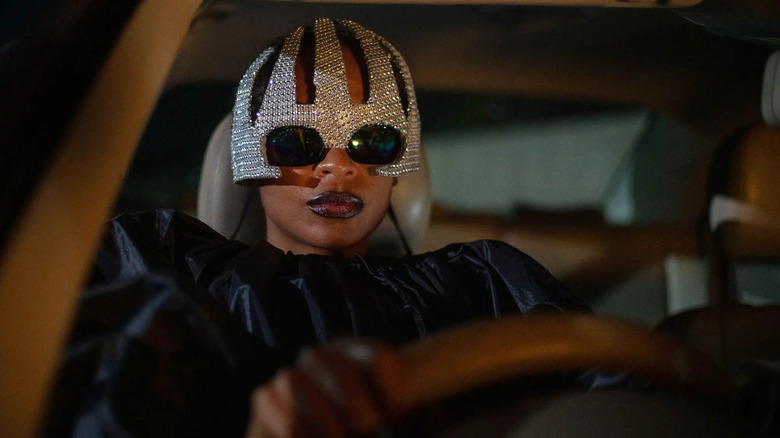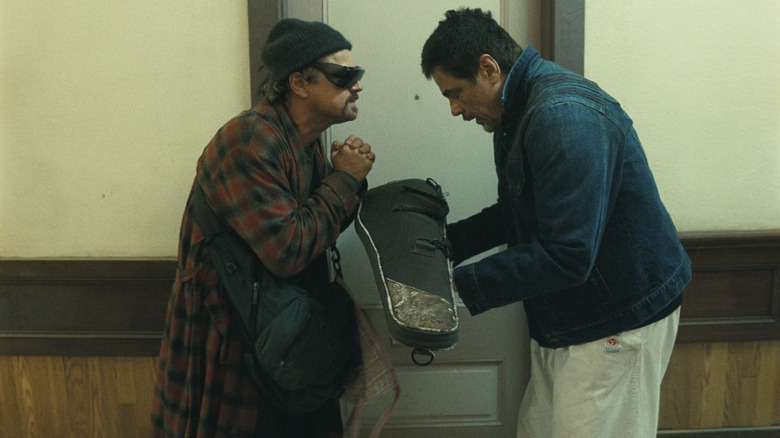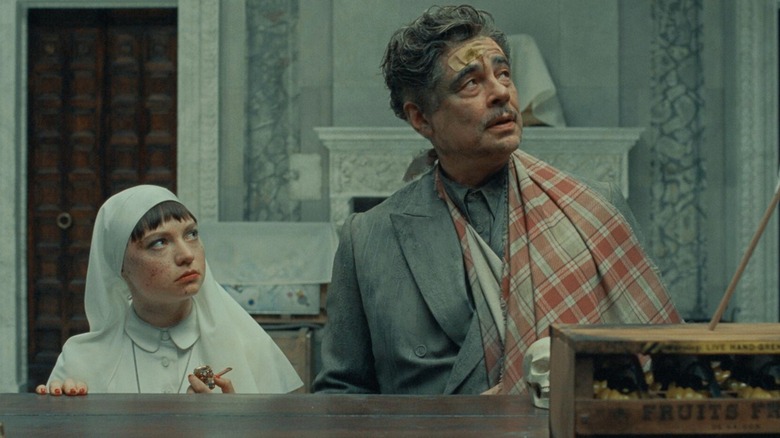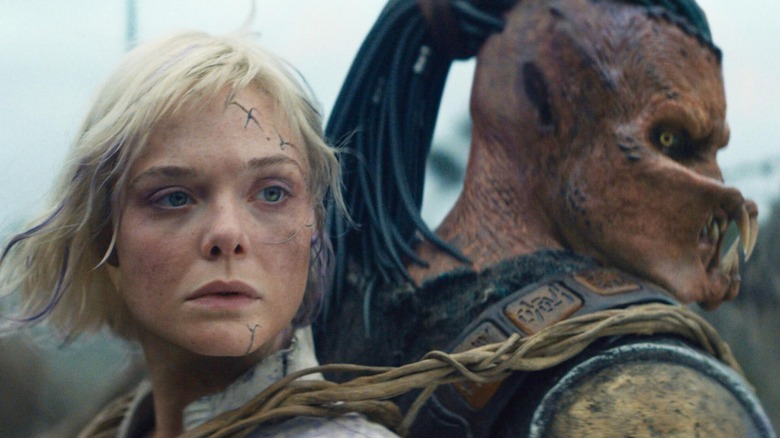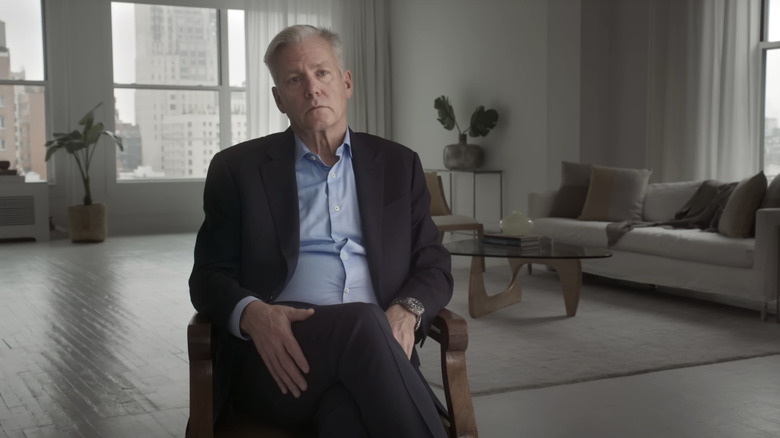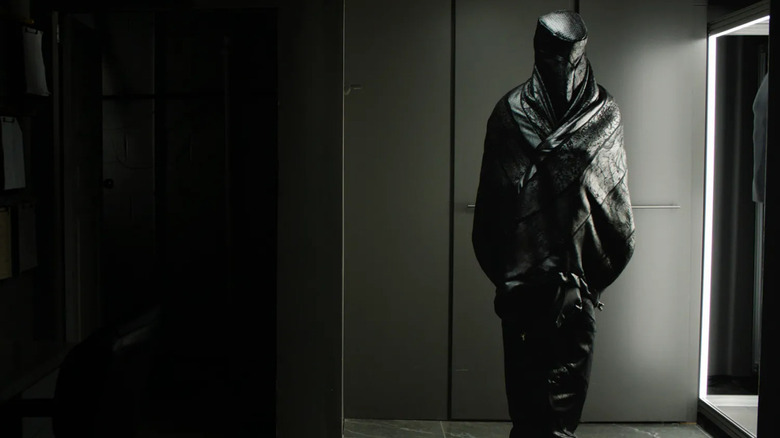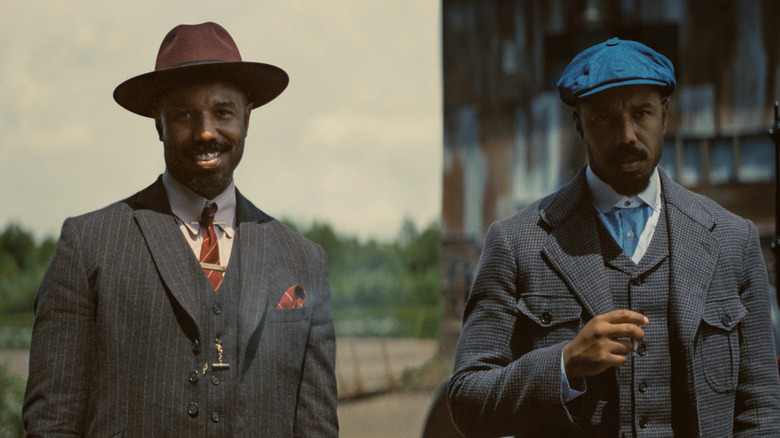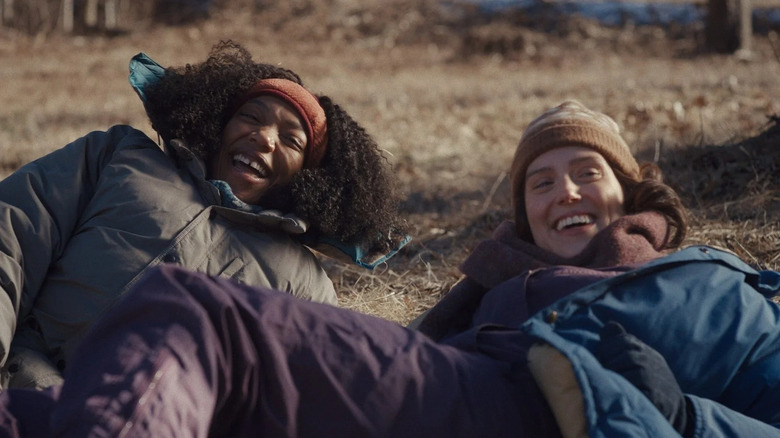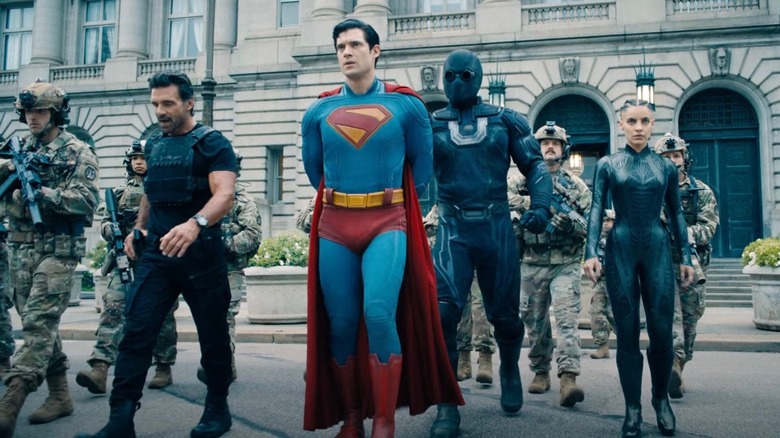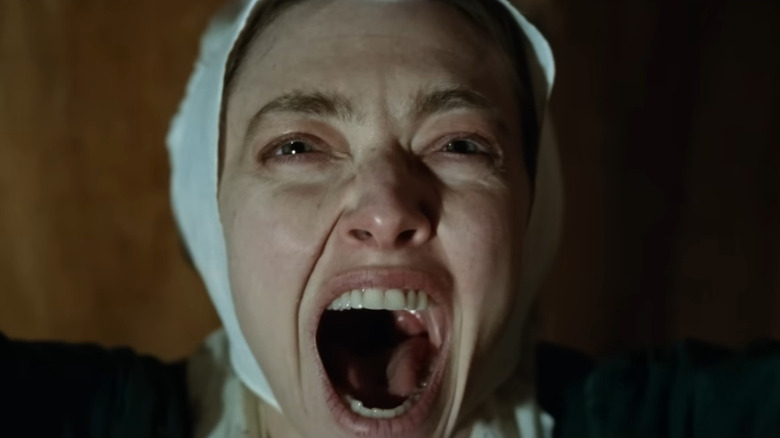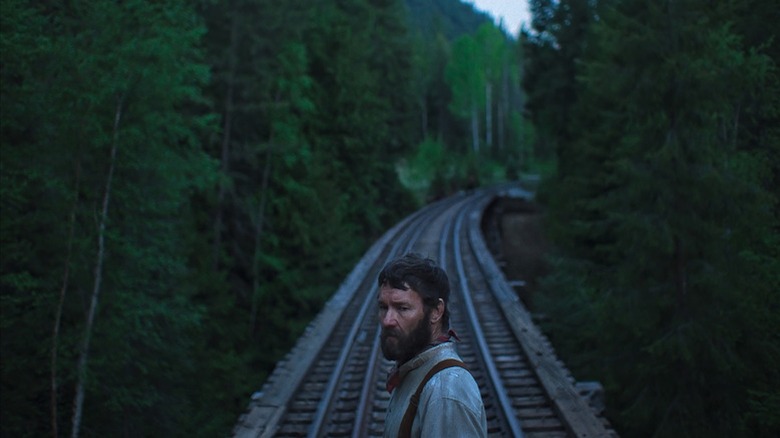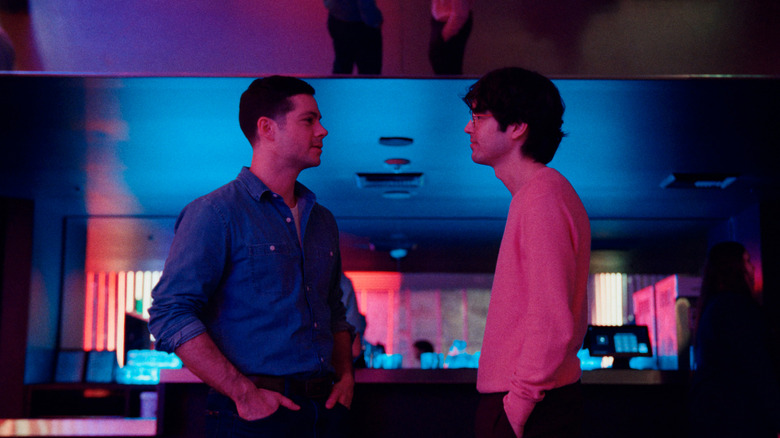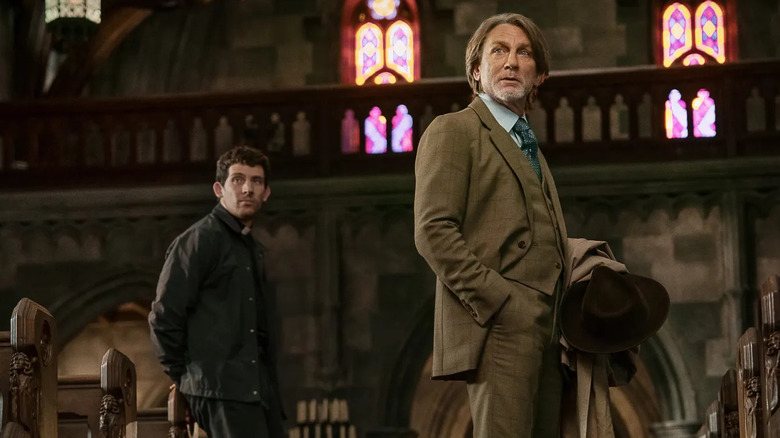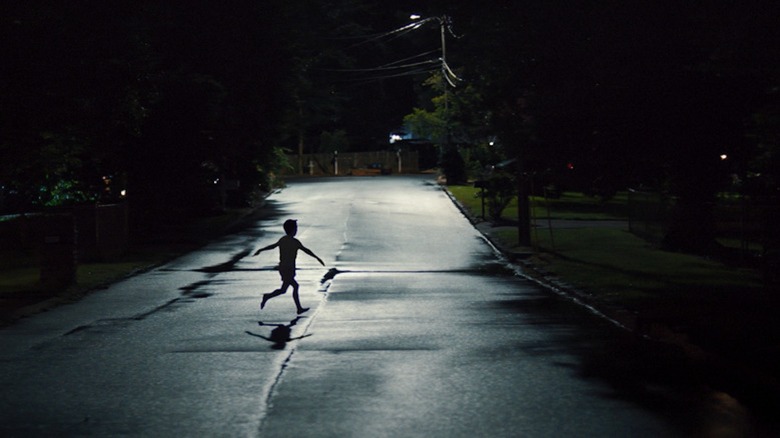34 Best Movies Of 2025
It feels like something we say every year, but 2025 proved to be a pretty fantastic year for movies. From original horror hits that broke box office expectations, to capes & tights flicks keeping "superhero fatigue" from ever truly settling in, and everything in between, these past 12 months have been stacked with fantastic films. Some of the movies featured on this list are currently playing in theaters, while others are now streaming or available for rental on digital. But the one thing that every movie here has in common is that it's worth tracking down, especially if it's a film that you're hearing about for the first time. We here at /Film watch a lot of movies, and these are the best of 2025. Give them a watch, talk about them with your friends, and maybe you'll get lucky and find your new favorite film of the year.
28 Years Later
I'm not normally a big zombie fan, but "28 Years Later" had me hooked from the moment that incredible trailer dropped last year. The movie itself didn't disappoint, providing a glorious return to the franchise for director Danny Boyle and screenwriter Alex Garland, almost a quarter of a century since they made everyone sit up and take notice with "28 Days Later." They're not simply content to rinse-and-repeat the usual formula, either, expanding the scope of the story to envision Britain as a quarantine zone isolated from mainland Europe where survivors from the Rage virus make do and mend on their island refuge.
The unmistakable Brexit allegory hits especially hard as a British expat watching events unfold in my home country, but, politics aside, "28 Years Later" is an ambitious odyssey that veers from coming-of-age tale to survival horror to something far more meditative and poignant when we finally reach the enigmatic Bone Temple. That's all before Boyle and Garland deliver a controversy-baiting cliffhanger in the final moments — I can't wait to see how that gets resolved in the second part. Such tonal shifts are jarring and audacious, but the cause is helped by committed performances from Jodie Comer, Aaron Taylor-Johnson, a scene-stealing Ralph Fiennes, and particularly Alfie Williams in what will surely prove to be a major breakthrough role as our young protagonist. "28 Years Later" isn't a perfect film, but the flaws make it one of the year's most interesting movies, and it's a rare threequel that exceeds its predecessors in terms of imagination and substance. (Lee Adams)
Avatar: Fire and Ash
The "Avatar" movies will continue until morale improves, and thank the Film Gods for that. If one is a fluke and two can be chalked up as a coincidence, then a third film tying a bow on this iteration of the saga and leaving us desperate for more is irrefutable proof of a pattern — that being how James Cameron remains the undisputed king of the blockbusters. The technological wizardry is as dazzling as ever, the scope and scale of the adventure literally takes your breath away, and the narrative itself (long a sticking point among detractors) feels like the most complex and spiritual one yet. This time around, it's not merely Na'vi against humans (and humans cosplaying in Na'vi avatars), but Na'vi against Na'vi ... with the Sully family itself not immune to this infighting, either.
"Fire and Ash" picks up where "The Way of Water" left off, continuing Jake (Sam Worthington) and Neytiri's (Zoe Saldaña) domestic drama and their ongoing war against even more fearsome foes. If it feels like an extended epilogue to the previous sequel, that's precisely the point. This storytelling choice is the fuel that drives the engine here, allowing all of our characters to sit with the consequences of their actions, truly reckon with a new way forward, and tee up more conflict to come. If it wasn't obvious before, it is now: Cameron has once again redefined populist cinema, and we're all privileged to come along for the ride. (Jeremy Mathai)
Black Bag
You wouldn't necessarily expect the writer of "Jurassic Park," "Spider-Man," and "Indiana Jones and the Kingdom of the Crystal Skull" to deliver a smart, witty, taut spy thriller, but this under-the-radar entry is easily one of 2025's best and most overlooked films. It might even be one of writer David Koepp's best just in terms of the sheer efficiency of the script, which, for a story that involves a lot of hushed talking in desaturated rooms, never once feels like it lets up.
Directed by Steven Soderbergh, this sleek spy thriller stars Michael Fassbender as veteran British intelligence officer George Woodhouse, who's faced with the vertiginous task of identifying a traitor in the service, one of whom could very well be his wife, Kathryn (Cate Blanchett). As such, "Black Bag" is just as interested in interrogating the challenges of marriage as it is in showcasing naturalistic spy craft — both of which it does flawlessly, essentially giving viewers two gripping films in one.
The dialogue is mercilessly efficient, the performances are consistently excellent, and the story is compelling throughout. If that's not enough for you, Pierce Brosnan shows up at one point and steals the spotlight from Fassbender, who's already putting on a masterclass. As such, if you missed "Black Bag" when it dropped, consider it your solemn duty to King and country to watch it as soon as possible. (Joe Roberts)
Bugonia
Emma Stone's creative partnership with Yorgos Lanthimos — which kicked off in 2018 with "The Favourite" — has brought this two-time Oscar-winning actress to new heights, and that's definitely true in their latest project, "Bugonia." Stone plays Michelle Fuller, a wealthy and powerful CEO who is suddenly and violently kidnapped by a worker at one of her own processing centers, Teddy Gatz (Jesse Plemons, reuniting with Stone and Lanthimos after 2024's "Kinds of Kindness"), and his mentally disabled cousin Don (Aidan Delbis, making a truly astonishing film debut). Why does Teddy take this seemingly random woman hostage? Not only did Teddy's mom, played by Alicia Silverstone in brief flashbacks, enter into an ultimately unsuccessful clinical trial with Michelle's biotech company, Auxolith, which left her in a coma, but there's another part to this puzzle. Teddy genuinely and passionately believes Michelle is an alien hailing from a race he calls Andromedons, and he's desperate for information about these particular aliens and their apparent hostile takeover of Earth.
I don't want to say whether Teddy is right or wrong and spoil everything, but "Bugonia" has plenty of tricks up its sleeves, none of which feel gratuitous, thanks in large part to Will Tracy's smart script and the central performances delivered by Stone, Plemons, and Delbis alike. When the credits roll, you might find yourself sitting in the theater in complete shock, which is to be expected; "Bugonia" puts the pedal to the metal and doesn't let up until its very last moments. (Nina Starner)
Cloud
If you've ever had the paranoid suspicion that everyone online is mad at you, Kiyoshi Kurosawa's "Cloud" wants you to know that yes, yes, they are. With "Cloud," Kurosawa, a master of genre responsible for bone-chilling movies such as "Cure" and "Pulse," has crafted a darkly funny reflection of our modern world where people are obsessed with dealing out retribution for online slights. Yoshii (Masaki Suda) makes a living selling used items online for a high markup. Everything seems to be going pretty well for Yoshii, so much so that he's able to hire an assistant, the committed Sano (Daiken Okudaira). Unfortunately, Yoshii's questionable business practices begin to incur the wrath of his customers, who band together on an online forum to plot revenge.
Kurosawa's film keeps you guessing from start to finish, as the narrative grows increasingly strange and violent with each twist and turn. "Cloud" hasn't had the most accessible release in the United States, but folks who subscribe to the Criterion Channel will thankfully be able to start streaming it beginning on October 7, 2025. (Chris Evangelista)
Eddington
For the record, I must say that I haven't had the chance to watch Paul Thomas Anderson's "One Battle After Another" yet, which apparently plays very much in the same league as Ari Aster's "Eddington," but with better results. Still, Aster's uncompromising vision of today's breathlessly raging America through a small-town sheriff (Joaquin Phoenix giving his best) battling COVID — alongside his many personal flaws — is one of the most thought-provoking watches of the year. It's a painstaking character study of ignorance, boiling fury, and social dysfunction that turns as ugly, violent, and intensely engaging as it can get.
Fittingly, "Eddington" flopped at the box office and received mixed reviews from both critics and viewers. No surprise there since the film holds up a mirror to the American people, and what looks back from it is not only unflattering but downright poisonous and rotten. Of course, it's a satire, slightly exaggerating every differing perspective, but the sad truth is that it's not far off from where we are today as a society. It's a relentless deep dive with its two-and-a-half-hour runtime that only comes up for air occasionally, and even then, the relief it allows for its viewer is an uncomfortable laugh at best. I say good because the immoral level we allowed ourselves to sink down to is no laughing matter, but one that requires some serious self-reflection. And the need for movies that remind us of that is at an all-time high. (Akos Peterbencze)
Eephus
The bittersweet sentiment "this too shall pass" oozes through every frame of director Carson Lund's film "Eephus," and its presence both soothes and aches simultaneously. The movie is a quiet yet surprisingly busy hangout film set on the last day of a small town in Massachusetts' baseball diamond before the land is used to build a new school. Two local teams, Adler's Paint and the Riverdogs, play one final unofficial game, and though the proceedings are friendly, they're not without their own dramatic stakes. Every man present knows that many things are ending forever this day — their pastime, their stats, their passion, maybe even some of their friendships.
Lund, his co-screenwriters, and the film's charming ensemble cast of mostly unknown actors only add to the authenticity of the film, allowing its tenderness to feel that much more relatable and earned. Like the titular low-velocity pitching technique in which the baseball seems to move impossibly slow toward home plate, "Eephus" is part slice-of-life indie dramedy, part myth, even if that myth is nothing more than local legend. The film is the cinematic equivalent of a late-period Springsteen song, an ode to hometown heroes as well as a place that existed once upon a time. As we barrel unstoppably forward into a troubling and uncertain future, it helps to remember to herald these eras' endings. Cinema may be dying, or it may simply be changing, but as long as there are films like "Eephus" out there getting made, we're not in danger of having the little joys in our lives go uncelebrated quite yet. (Bill Bria)
Eternity
There are countless movies about love. Many of them are run-of-the-mill, disposable forms of entertainment aimed at one of the most universal feelings known to humanity. Others are far better at making you feel romantic and all of the feelings that surround love. Few are as delightfully clever and deeply affecting as director David Freyne's "Eternity."
The movie largely takes place in a sort of afterlife way station, where souls have one week to decide where to spend eternity, with countless different eternities to choose from. Joan (Elizabeth Olsen) is faced with the impossible choice between Larry (Miles Telleer), the husband she spent her life with, or Luke (Callum Turner), her first love who died young and has waited decades for her on the other side.
Freyne rather brilliantly, and heartbreakingly, sets up an impossible dilemma that this movie is forced to contend with. Joan, Larry, and Luke are all easy to sympathize with, making for an unmatched rollercoaster of emotions that made me cry about five times. Happy tears. Sad tears. Cathartic tears. All of it. It's all equal parts devastating and invigorating, as great love stories often are. The world that Freyne crafts is admirably inventive, while also injecting much-needed humor amidst the heartache. Miles Teller has never been better. Elizabeth Olsen is at her peak. Oscar-winner Da'Vine Joy Randolph is a delight. Top to bottom, it's a best-case scenario when it comes to examining love and loss through the cinematic lens. (Ryan Scott)
F1
Everybody loves a good underdog story, but "F1" combines that with a "phoenix rises from the ashes" sentiment in the most exhilarating way: by bringing Formula One into the mix. The movie's core appeal is no rocket science, as it pits reckless, down-on-his-luck (but experienced) driver Sonny Hayes (Brad Pitt) against the young, gifted (but conceited) Joshua Pearce (Damson Idris), both in and out of the race track. Throw in charismatic characters like racing team lead Ruben (Javier Bardem) and technical director Kate (Kerry Condon) into the mix, and we have a frenetic story where the unpredictable journey matters more than the destination. Expect melodrama, spectacle, and the glory of motor racing, replete with a climactic Lewis Hamilton cameo that adds to the hype of this sleek racing flick.
"F1" knows how to fine-tune your expectations at every turn — it swerves into subtle interiority right in the midst of a prestigious competition and heightens the stakes when you least expect it. Then there's Sonny, who takes turns to excite and exasperate his coworkers, while indulging in a high-risk, high-reward racing style that extends to every aspect of his personality. Idris Joshua is electrifying to watch as well, as he embodies the hope-laced hubris of youth — watching Joshua mire in jealous frustration while playing Icarus, where he eventually makes a sincerely earned comeback, is the beating heart of "F1." The magic, however, lies in enthused teamwork and camaraderie as the cars whizz past and the crowds cheer. (Debopriyaa Dutta)
Frankenstein
Like Victor Frankenstein (Oscar Isaac) mastering the spark of life, Guillermo del Toro making his "Frankenstein" movie is him finally realizing an all-consuming dream. Even so, del Toro is undeniably more taken with Frankenstein's Creature (Jacob Elordi). GDT's entire filmmaking career is a monument to his adoration of monsters, but you never forget the first one you loved. A lot's been discussed of where "Frankenstein" is and isn't faithful to the book. As intriguing as that is from an academic standpoint, it distracts from why this film works.
Isaac, playing Victor as a scoundrel, gives a performance worthy of 1950s Hammer horror films. Victor may brood, but Elordi's puppy-dog-eyed Creature is the truly sensitive and soulful one. "Frankenstein" has the expected visual splendor of a del Toro picture. The Creature's makeup brings out the strengths of Elordi's performance, instead of burying them. The set design of ancient castles and ballroom costumes feel both true-to-the-era and fantastical.
Yet, crucial scenes of the framing device show that del Toro, production design mastermind that he is, can make even the desolate Arctic beautiful. Beauty, too, lies in dialogue flourishes with poetry worthy of "Frankenstein" author Mary Shelley and her contemporaries. The Universal "Frankenstein" films spurred audiences a century ago to scream, but keen watchers since like a young del Toro knew to pity the monster (Boris Karloff). He's now made the first "Frankenstein" that'll inspire tears of sadness, but by the end, also joy. (Devin Meenan)
Hamnet
Based on a novel of the same name by Maggie O'Farrell, who also co-wrote the screenplay with Oscar-winning director Chloé Zhao, "Hamnet" tells a sort-of-true story about the real son of William Shakespeare, named Hamnet, who died when he was very young. Based on that description, "Hamnet" might not sound like your cup of tea, but Zhao and O'Farrell's film rewards you after you witness the pain and cruelty of a young boy being ripped away from his mother by a devastating illness. Jessie Buckley, a clear front-runner for the Academy Award for Best Actress, opens and closes the movie as Agnes, a wild and free young woman who ends up falling in love with a poor local tutor that just so happens to be William Shakespeare (Paul Mescal). They have three children, and yes, Hamnet (Jacobi Jupe), twin to Judith (Olivia Lynes) and younger brother to Susanna (Bodhi Rae Breathnach), dies from the plague, leaving Agnes in ruins and the family in tatters.
That ending, though. The entire premise of "Hamnet" is that Hamnet and Hamlet are interchangeable names and that, in his grieving period after Hamnet's death, Shakespeare was inspired to craft his masterful tragedy "Hamlet." People will keep quibbling with this very idea for a long time, but go ahead and watch Agnes take in a performance of Hamlet with such reverence that it becomes a borderline religious experience, and you won't feel like arguing about much at all. (Nina Starner)
The History of Sound
Oliver Hermanus' romance "The History of Sound" is subdued almost to a fault. The emotions are large, but the expression of those emotions is understated to the point of mere subtlety. The affection shared by the unassuming music professors Lionel (Paul Mescal) and David (Josh O'Connor) comes out in incidental ways, as when one of them retrieves the feathers that fell out of the other's pillow. Entire complex lives live hidden in those simple a cappella melodies. Every song in "The History of Sound" is a childhood memory, a piece of nostalgia for when your heart throbbed more dramatically. The film is a work of beauty.
Lionel and David meet each other in 1917 and casually fall in love. They have a secret affair (their queerness verboten), and their love comes out in conversation. Their love is a catalyst for music preservation and the key to unlocking the honest memories and peaceful impulses in an otherwise violent, turbulent nation. There are themes of class (Lionel was raised in a remote cabin, David in the city), and the horrors of war lurk underneath everything. The ending is a real heartbreaker, but it proves what a stellar, emotional work the film is. (Witney Seibold)
If I Had Legs I'd Kick You
Mary Bronstein's "If I Had Legs I'd Kick You" is an emotionally decimating film that completely rewires your brain when it comes to whatever it was we thought we knew about motherhood. The haunting A24 drama centers on Linda (Rose Byrne delivering her best performance yet), a psychotherapist who knows on paper what it takes to be a good mother and to provide the best life for her child. But life doesn't care about that, and there's no instruction manual when it feels like you're falling out of a plane and bracing for impact that might not ever come. The film focuses so tightly on Linda that we don't see her daughter (Delaney Quinn) in full for nearly the entire movie. She exists less as a person to us and more as a disembodied force of nature in control of every aspect of Linda's reality.
Bronstein's film also finds great joy in the absurdity of life's daily pressures and isn't afraid to laugh at how ridiculous an experience it is to be human. Many will view this in a similar vein as "The Babadook" and decry this as a movie that makes folks "never want to have children," but for those who already have them or pride themselves in being part of the village it takes to raise them, it's a reminder that no one should be going through this alone. We have to look out for each other. It's the only way we'll make it. (BJ Colangelo)
Is This Thing On?
Director Bradley Cooper's "Is This Thing On?" features a career-defining performance by Will Arnett as a divorced man who finds a therapeutic outlet for his grief and frustration in the form of stand-up comedy.
Cooper's previous directorial efforts have been nothing short of grand and ambitious, whether it's the powerful romance and drama of "A Star Is Born" or "Maestro," an artistic biopic about composer Leonard Bernstein. But "Is This Thing On?" paints an intimate portrait of uncertainty as Alex (Arnett) and his wife Tess (Laura Dern) navigate their recent divorce and question both their roles in their respective lives and the trajectory of their own lives in the wake of their relationship seemingly ending.
The way Cooper shoots Alex's stand-up comedy debut is unnervingly claustrophobic, perfectly capturing the nerves and pressure of being on stage with the purpose of making strangers laugh. Meanwhile, Tess has a significant journey of her own, as she has to come to terms with the life that she gave up as an Olympic athlete in order to have kids with Alex.
The result is a magnetic and authentic story brought to life magnificently by powerhouse performances from both Arnett and Dern, but it's the former who truly wows, appearing more vulnerable than he's ever been before. While it might feel formulaic on the surface, "Is This Thing On?" showcases the complexities of marriage in the kind of raw and real fashion that we don't often see in the movies anymore, and it's definitely one of the best films of the year.
It Was Just An Accident
Art can often be an extension of a filmmaker grappling with their frustrations with an unjust world. For Iranian filmmaker Jafar Panahi, "It Was Just An Accident" is an incredibly bold act of cinematic rebellion. He's often been the target of censorship and unwarranted imprisonment for daring to criticize the Iranian regime. This has prompted Panahi to shoot most of his later work in secret, and the result is one of the year's most gripping and culturally important films. It all starts when an auto mechanic named Vahid (Vahid Mobasseri) thinks he hears the creak of a prosthetic leg that belongs to a guard (Ebrahim Azizi) who tortured him in prison. He nearly buries him alive, that is, until doubt starts to creep in. Vahid feels compelled to convene with other political prisoners to not only make sure he has the right man but to confront the ethics of killing him as an act of revenge.
"It Was Just An Accident" masterfully walks that line of disturbing emotional truths and dark comedy in a manner that complements the other. It makes for an anxiety-inducing morality interrogation in which there are no easy answers. Panahi uses the form to externalize the pain he lives with for wanting to make movies. The fact that he even got this made with all eyes on him is an achievement in itself. I remember the exact moment this film left a pit in my stomach that I still haven't been able to shake. (Quinn Bilodeau)
KPop Demon Hunters
2025 has been a great year for original films becoming sensations, but few have come out of nowhere to completely dominate pop culture conversations quite like the most-watched Netflix Original film of all time, "KPop Demon Hunters." The film centers on a K-pop girl group called HUNTR/X, comprised of pop idols Rumi (Arden Cho/EJAE), Mira (May Hong/Audrey Nuna), and Zoey (Ji-young Yoo/Rei Ami). The trio is not only one of the most popular musical acts in the world, but they're also the latest in a long lineage of demon hunters tasked with using their musical talent to maintain the Honmoon barrier that seals demons — and their leader, Gwi-Ma ("Squid Game" villain Lee Byung-hun) — from the human world.
The music has become a phenomenon heading toward awards contention, with the lead track "Golden" even becoming one of the new go-to CPR songs. Given the streaming popularity of both the movie "KPop Demon Hunters" and its accompanying soundtrack, it's clear that South Korean pop culture remains a force to be reckoned with. The combination of imaginative animated visuals, hit songs, and a four-quadrant story has been an unparalleled recipe for success. (BJ Colangelo)
The Long Walk
If the popularity of "Battle Royale," "The Hunger Games," and "Squid Game" have taught us anything, it's that there's something grimly fascinating about stories where you know almost all of the characters are going to die. Stephen King's last-man-standing novel "The Long Walk" predates all of the aforementioned stories by several decades, but it has one key difference that makes it feel fresh in a now well-worn genre: the boys in "The Long Walk" don't have to kill each other to survive. They just have to walk, and keep walking, until one is left walking alone.
The book was written in the aftermath of the Vietnam War, and that real-world influence carries over into director Francis Lawrence's movie adaptation — from the teenagers approaching the horrors ahead like a fun game, to the bandanna-headed character snapping moody black-and-white photos, to the Beat Generation-coded kid optimistically taking notes for a book he plans to write. Buthe theme of youth being sacrificed for the benefit of their elders is, sadly, pretty timeless.
Despite all this, "The Long Walk" isn't a downer movie. When the bodies start dropping, the remaining walkers don't respond by turning on each other, but by knitting their camaraderie together into even tighter loops. When one falters, the others become a very literal support system, determined to keep everyone moving towards the non-existent finish line. Because when you're walking through hell and there's no hope on the horizon, optimism is the ultimate act of defiance.
"The Long Walk" isn't just one of the best movies of the year. It's also one of the best Stephen King adaptations ever — and that's a category with a lot of competition. (Hannah Shaw-Williams)
Marty Supreme
Put simply, "Marty Supreme" is a film that exemplifies the power of cinema. It's a deliriously energetic, unpredictable, and wholly unique experience that still contains so much of what cinephiles love. To wit: it was shot on celluloid (35mm, baby), features a take-no-prisoners leading man turn from a newly established star (this could be Timothée Chalamet's Oscar year), an equally delightful breakout performance from a rising star (Odessa A'zion), an Oscar winner (Gwyneth Paltrow), and even some inspired stunt casting (in particular, NYC grime legend Abel Ferrara and "Shark Tank" antagonist Kevin O'Leary). Additionally, the film evokes elements of several time periods. It's set in the 1950s, yet manages to capture the live-wire energy of the American films of the '70s. On top of that, it contains the sound of the '80s, thanks to Daniel Lopatin's electronic score and a slew of killer needle drops.
"Marty Supreme" is so much more than just its aesthetics, however. It's a film of contrasts, one where co-writer Ronald Bronstein and co-writer/director Josh Safdie throw a ton of tonal ping pong balls in the air just to see how they'll collide. It's a little bit screwball comedy, a little bit antihero underdog story, a little bit flawed character study, a little bit sports biopic, a little bit addiction drama, and so on. "Marty Supreme" doesn't need to invoke other movies to remind you how electric, inventive, and fresh cinema can be. Instead, it encompasses those qualities all by itself. (Bill Bria)
The Naked Gun
Most went into Akiva Schaffer's "The Naked Gun" expecting a pointless remake that could never hold a candle to David Zucker, Jim Abrahams, and Jerry Zucker's original trilogy. We were wrong. "The Naked Gun" is one of the best comedies in years — and as a reboot of the classic Leslie Nielsen-starring flicks, it is more than worthy.
The best thing about "The Naked Gun" is that it's delightfully stupid, a talent that requires a high level of comedic genius to pull off. The dialogue and visual gags come thick and fast, with the most absurd moments delivered with straight-faced bravado, allowing Liam Neeson to spoof the action roles he is known for. Neeson portrays the dim-witted Lieutenant Frank Drebin Jr. with the sincerity of a "Taken" movie, only this time around, he is more interested in discussing the Black Eyed Peas than he is in bragging about having a particular set of skills. Pamela Anderson is also a treat as Beth Davenport, aka "Cherry Roosevelt Fat Bozo Chowing Spaghetti." The character wouldn't seem out of place in an elegant, old-school noir movie — when she isn't stealing chairs or performing some wacky musical numbers anyway.
Schaffer's movie (which he co-wrote with Dan Gregor and Doug Mand) is unabashedly puerile. There are fart jokes, scenes where grown-up detectives punch children through vending machines, and a gross-out moment involving a dog that turns out to be totally innocent. "The Naked Gun" only has one goal on its mind — to make us laugh — and it succeeds with aplomb. We need more movies like it (Kieran Fisher).
On Becoming a Guinea Fowl
Currently maintaining a 100% on Rotten Tomatoes with over 100 reviews logged from critics, "On Becoming a Guinea Fowl," the second feature by Zambian-Welsh director Rungano Nyoni, is the best film of 2025 that general audiences don't even know exists. The story centers on Shula (Susan Chardy), a woman who inadvertently becomes the home base for her family's grief and a family member's last rites after she stumbles upon the dead body of her uncle down the street from a brothel. Her uncle's passing sparks the traditional funeral proceedings rooted in their Bemba culture, and doing so means Shula and her cousins are forced to unpack the deeply buried secrets of their family head-on, examining the ways silence around these secrets has been able to fester for years.
As the funeral traditions carry on, the women are collectively subservient out of tradition, no matter their emotional turmoil, including crawling around the house on all fours as part of the ritualistic obligation. Nyoni incorporates harsh soundscapes and surrealist imagery to tell a powerful, feminist family drama that dares to ask the question, How do you mourn a man who was unforgivably violent to the most vulnerable members of the family when your culture and family grasps onto the belief that people are inherently good? (BJ Colangelo)
One Battle After Another
Is "One Battle After Another" 2025's most trenchant political commentary? Is it the action-comedy movie of the year? The Best Picture frontrunner? Living proof that auteur-driven epics still have a place in this otherwise dire studio system? Let's go with "All the above." Writer/director Paul Thomas Anderson has been stewing on this (very loose) adaptation of the Thomas Pynchon novel "Vineland" for the better part of two decades, so it's only fitting that the final result might go down as the jack of all trades and the master of all. Despite so much hand-wringing over an oversized budget and the financial irresponsibility thereof, leave it to one of the finest working filmmakers to render most of those discussions obsolete with what seems destined to stand as a cultural touchstone for years to come.
An incendiary story about revolutionary freedom fighters, a viciously racist (and deeply insecure) military man hoping to join the modern KKK, and the never-ending struggle to secure the rights of the most disenfranchised among us all, packaged within a crowd-pleasing blockbuster in the year of our lord 2025, is nothing short of a miracle. Fiction alone isn't enough to save us from the dystopian horrors of our everyday lives, but it can inspire and motivate us to actually stand up and do something about it. "One Battle After Another" might as well be a thematic manifesto and the timeliest of wakeup calls, wrapped in popcorn thrills. As Benicio del Toro's Sensei St. Carlos calmly informs Leonardo DiCaprio's Bob Ferguson, "You know what freedom is? No fear. Just like Tom Cruise." (Jeremy Mathai)
The Phoenician Scheme
You know what you're in for with a Wes Anderson joint: pastel set design, rapid-fire comedy from characters who speak with the speed of tongue twisters (with some occasional bursts of undignified physical comedy), etc. I don't think that's a bad thing, though. Anderson is a confident artist who knows his element and how to work perfection within it. Wherever there's a new Wes Anderson movie, I know what to expect — including that I'll probably have a lot of fun watching it. "The Phoenician Scheme" is no exception.
Anatole "Zsa-Zsa" Korda (Benicio del Toro) is a tycoon who sees age (and assassins) catching up to him, leaving him concerned about his legacy. He's currently engaged in a scheme to revitalize the fictional country of Phoenicia (it's right there on the poster!), and he also tries to mend fences with his estranged daughter, the nun-in-training Liesl (Mia Threapleton).
The two-hander mentor and mentee leads (and fictionalized 20th century) calls to mind Anderson's greatest triumph, "The Grand Budapest Hotel." This one, though, is a story of redemption, not nostalgia. In his last three films, Anderson has interspersed color and black-and-white scenes. Here, the black-and-white scenes are Zsa-Zsa's visions of the afterlife; he's thinking about how he'll be remembered and what awaits him. Beyond that, "Phoenician Scheme" has an episodic structure of Zsa-Zsa and Liesl traveling the world to visit their investors. Bryan Cranston and Tom Hanks' cameo as basketball-playing Sacramento businessmen brothers is especially funny. (Devin Meenan)
Predator: Badlands
Dan Trachtenberg's "Predator: Badlands" is the first franchise entry to feature a Yautja protagonist, which is a gamble with massive payoffs. This survival story about a fish-out-of-water Predator dips its toes into the most bankable sci-fi tropes: the loss of honor, a life-or-death quest on a dangerous planet, and begrudging alliances that turn into lifelong bonds. A standard franchise framework sets up the antagonist ideology (MU/TH/UR oversees corporate directives and manipulative androids are driven by apathy), but "Predator: Badlands" is more interested in Dek (Dimitrius Schuster-Koloamatangi) and the broken android Thia (Elle Fanning), and how the latter compels the former to re-evaluate his identity/values as a Yautja.
The movie's greatest strength is the lush world of Genna, whose ecosystem is rife with intricately designed creatures that play a seminal role in Dek's journey. Trachtenberg's fascination with inter-species interactions is a game-changer here, as this curiosity makes the action-driven sci-fi spectacle moments feel more impactful and grounded. There's a lot to love about these grand set-pieces, but "Predator: Badlands" wins us over with the quiet moments, such as when a native creature mimics Dek as a display of endearment. The term "predator" also undergoes considerable scrutiny when we're treated to the nuances of Yautja culture and how outliers like Dek (and Thia) learn to grow out of rigid, authoritarian worldviews. Trachtenberg's film also sports an unironic "maybe the real treasure was the friends we made along the way" throughline, which is always a welcome sentiment. (Debopriyaa Dutta)
Predators
Thanks to podcasts, Netflix, and media at large, true crime has a massive fanbase. But in some cases, that can result in a morally and ethically questionable approach to bringing criminals to justice. The 2025 documentary "Predators" aims to scrutinize a sect of true crime that became a TV sensation thanks to the series "To Catch a Predator," a spin-off of Dateline NBC that featured host Chris Hansen (seen above) leading a sting operation that confronted adult men who attempted to engage in sex with underage children after talking with them in online chatrooms.
"Predators" will undoubtedly make some viewers uncomfortable, as it points out the ethical question of turning what should be justice and rehabilitation for pedophiles into a dopamine rush of entertainment that they gleefully enjoyed. While the documentary doesn't ask audiences to dismiss or forget the potentially heinous actions of men trying to have sex with minors, it points out that we shouldn't be clapping and cheering at how these crimes were exposed for profit, especially when there's such a lack of follow-through in effectively prosecuting and rehabilitating them in any meaningful or helpful way."Predators" does what any good documentary should do, by opening your eyes to a perspective that you might have never considered yourself, and it paints a thorough portrait of a complex issue that deserves more scrutiny, analysis and care. (Ethan Anderton)
The Shrouds
The death of David Cronenberg's wife directly inspired "The Shrouds," the latest work from the Canadian master of body horror. That makes the events of the film all the more profound, as the film follows the story of a man grieving the death of his wife. Played by Vincent Cassel, this lead character even has more or less the same exact hairstyle as Cronenberg, just to hammer home the autobiographical elements. Cassel's character Karsh is the inventor of GraveTech, which is essentially a live webcam placed inside a grave that allows people to watch their deceased loved ones decay in real-time. It's a delightfully ghoulish concept, and "The Shrouds" has a twisted sense of humor.
But there's a deep well of loss and sorrow at play here, as Karsh grapples with the death of his wife (played by Diane Kruger) while grappling with his attraction for her sister (also played by Diane Kruger) and dealing with a duplicitous AI assistant named Hunny (played by, you guessed it, Diane Kruger). I've seen some folks claim that "The Shrouds" is a lesser work from Cronenberg, but nothing could be farther from the truth. This strange mix of horror, comedy, drama, and mystery finds the 82-year-old filmmaker still very much at the top of his game, creating a deeply personal film full of haunting longing. (Chris Evangelista)
Sinners
Despite only having five features to his name, Ryan Coogler has proven himself to be one of our finest filmmakers. He is adept at making blockbuster movies full of spectacle that also contain layers of mature themes and offer some poignant commentary, and in many ways, "Sinners" feels like the culmination of that. This is a crowd-pleasing blockbuster movie with a killer soundtrack, a phenomenal cast, memorable characters, thrilling action, some legitimately good scares, plenty of gore, and also a surprising amount of social commentary that plays on real history and vampire movie lore.
Coogler crafted a movie that can be seen from a multitude of angles and perspectives, always finding something to love and something to learn. It is also just a masterclass in genre-switching, much like the original "Predator," with the movie going from a small-scale drama about a community to a full-blown siege thriller, both halves connected by the power of music and its importance to African American history. We have seen horror blockbusters do big in recent years, but the explicitly adult approach to "Sinners," from its themes to its open sexuality, makes it a bit of a miracle — one that Coogler expertly executes. (Rafael Motamayor)
Sirat
Óliver Laxe's "Sirat" is the darkest movie of 2025, but it is also a movie with a killer sound design and a fantastic soundtrack that almost tricks you into thinking this will be a fun movie about attending raves in the desert. That's because the movie is technically about a group of misfits at a rave in the Moroccan desert who are on a quest to find the next big party spot (accompanied by a father searching for his missing daughter alongside his young son).
Yet, it doesn't take long for the movie to reveal itself as a story about the end of the world, with a background conflict increasingly raising the stakes. This is a disaster movie, but it's a testament to Laxe's storytelling skills that the worldbuilding happening in the background is as interesting as the main plot, and also informs the narrative at every step. This is a movie about recognizing that society is falling apart, about recognizing signs big and small of imminent collapse, and how futile it is to try and ignore it all. By the time the characters, and the audience, realize just what they've got themselves into, "Sirat" explodes into an unforgivable and unforgettable story about how there is no escapism in times of crisis. There is simply no film as gut-punchingly hard to swallow as "Sirat" in 2025, and it's a movie you won't ever forget. (Rafael Motamayor)
Sorry, Baby
Eva Victor made an unforgettable entrance into feature filmmaking with "Sorry, Baby," a debut as emotionally raw as it is sharply funny. Victor, who not only directs but also writes and stars in the film, brings a deeply personal lens to a story that shifts seamlessly from disarming humor to emotional devastation, anchored by an intimate honesty that resonates into something more universal. At its heart, "Sorry, Baby" is a meditation on grief, friendship, and the strange limbo of life continuing in the aftermath of personal catastrophe, told through a non-linear narrative that feels reflective of the way trauma disrupts time.
Rather than leaning on melodrama, the film finds strength in quiet moments and unresolved emotions, capturing the complexity of platonic love between Agnes (Victor) and Lydie (Naomi Ackie) — two PhD candidates whose bond is unshakable even in the wake of unfathomable hardships — and the endurance it requires. "Sorry, Baby" has become one of the standout releases in A24's catalog, and Victor's voice as a filmmaker is already so assured that it's almost hard to believe this is a debut. (BJ Colangelo)
Superman
James Gunn's "Superman" has a whole lot riding on its broad, caped shoulders, serving as the first big tentpole film in Gunn's DC Universe and establishing his version of Superman and his many allies and enemies. Starring David Corenswet as the titular hero, who hides out by day as bespectacled Daily Planet reporter Clark Kent, "Superman" is everything a superhero movie should be and more. It's a heartfelt crowd-pleaser that's willing to get silly with a phenomenal supporting cast that includes Nicholas Hoult as Lex Luthor, Nathan Fillion as Green Lantern Guy Gardner, and Rachel Brosnahan as Lois Lane. There are plenty of deep-cut references and killer comic book cameos to satisfy even the most hardcore DC Comics fan while also telling a story about identity and family that's pretty darn universal, whether you're from Kansas or Krypton.
Gunn made the smart decision not to tell "Superman" as an origin story, but it does feature a lot of Superman processing his own origins; "Superman" is a story about an immigrant who loves America even when it's hostile to him and claims him as an enemy. It's a potentially controversial story that's told with a lot of heart and humor, and it's exactly the Superman story that we need right now. There's also a ridiculously cute super-dog, a phenomenal soundtrack, and some truly exciting action sequences, making it so "Superman" has a little something for everyone. (Danielle Ryan)
The Testament of Ann Lee
Mona Fastvold's "The Testament of Ann Lee" features one of the most interesting depictions of faith for the screen. Song and dance serves as euphoric autonomy to cope with a broken world. Written by Fastvold and "The Brutalist" director Brady Corbet, "Ann Lee" recounts the story of the titular founder of the Shakers in the form of a gorgeously surreal 18th century folk musical that attempts to capture the origins of her rapturous spirituality. Amanda Seyfried is nothing short of phenomenal as the hailed female Christ who built her utopian movement of celibacy and pacifism as a means of leaving the ways of the old world behind. It's an incredibly sad, yet strangely uplifting story that materializes the act of spiritual possession through Daniel Blumberg's music and Celia Rowlson Hall's choreography.
Fastvold wisely presents this as a fable that invites you to experience this story through the reverential narrative perspective of Thomasin Mackenzie's Mary, yet leaves room for multiple readings. Mother Ann Lee was a complicated figure in the religious community, and the film allows enough grace to empathize with her disdain for the cruelty of the modern world. It also quietly interrogates the fruitfulness of her mission and whether her faith is enough to weather the storm it portends. I was consistently enraptured at how Fastvold visualizes this time and place; there's an especially beautiful scene on a boat to New England that had my jaw on the floor. "Ann Lee" will make believers of you yet. (Quinn Bilodeau)
Train Dreams
Clint Bentley's "Train Dreams" wears its Terrence Malick influence on its thick flannel sleeve, but while the aesthetic is familiar, this lovingly crafted film is anything but apery. Adapted from Denis Johnson's novella of the same title, "Train Dreams" casts a melancholy spell from the outset as we're introduced to Robert Grainier (Joel Edgerton), an orphaned boy who knows nothing of his parents and is unaware of the exact date of his birth. He does know that he exists, but, per the film's narration (plainspoken to weathered perfection by Will Patton), he hasn't a clue as to what to do with this life inexplicably given to him. He wanders purposelessly about Bonners Ferry, Idaho until he encounters Gladys (Felicity Jones), who is clearly his soft-spoken soulmate. They build a home and a life together, one that the world quietly, cruelly tears asunder.
Edgerton has found in Grainier an ideal showcase for his enigmatically taciturn demeanor. There is nothing inviting about this man. As a railroad worker, helping to expand the country, Granier is a man of his time, but he also seems to be living outside of it. He is unsettled by the racist violence visited on his Chinese co-workers, and haunted by the people he loses along the way. This life is never less than confounding to him. Via the rich, meticulously shaped sound design, we hear, as he does, the whispers of a mysterious world that cannot be solved. One can only connect. Ultimately, Granier does. (Jeremy Smith)
Twinless
It's always a pleasant surprise when a movie toes the line between several different genres, making it difficult to pin down. Such is the case with "Twinless," a psychological thriller that's also a dark comedy and a drama about grief that lets "The Maze Runner" star Dylan O'Brien prove that his career can take the same compelling turns as fellow young adult cinema breakout star Robert Pattinson. In "Twinless," Dylan O'Brien plays Roman, a young man grieving the death of his identical twin brother Rocky after a tragic car accident. When he stumbles upon a support group for twinless twins, he meets a man named Dennis (James Sweeney, who also makes a confident directorial debut with the film), and the two strike up a warm friendship that lets them both find solace in each other's presence.
However, what makes "Twinless" particularly excellent and unique lies in a surprising turn that the story makes, one that we don't want to spoil here. But let's just say that it creates a total tonal shift in the movie that is absolutely riveting. Sweeney does a magnificent job playing a pathetic sort of friend, and O'Brien shows incredible range, playing dual roles in a story that lets him show many different sides to his talent."Twinless" is funny, heartbreaking, shocking, and easily one of the best movies of the year. (Ethan Anderton)
Wake Up Dead Man
The third entry in Rian Johnson and Daniel Craig's whodunit series "Knives Out" might just be its best. (The first one still stands at the top of the pack for me, but this one is a close second.) "Wake Up Dead Man" makes a bold choice by not even bringing Craig's Southern-fried detective Benoit Blanc in for nearly an hour, letting Josh O'Connor run the show for all that time ... and this pays off beautifully, both by preventing the movie from feeling like a lazy retread of "Knives Out" or "Glass Onion" and by giving the spotlight to such a talented performer.
O'Connor plays Reverend Jud Duplenticy, a younger priest transferred to the insular Our Lady of Perpetual Fortitude to work underneath the aggressive, openly hateful, and enormously spiteful Monsignor Jefferson Wicks (a brilliant Josh Brolin, who's having a very, very good year as an actor). Jud and Wicks butt heads quickly, but before long, Wicks turns up dead in a particularly strange and seemingly impossible manner, which essentially summons Blanc to the scene of the crime. Aided by Glenn Close, Kerry Washington, Andrew Scott, Jeremy Renner, Mila Kunis, Thomas Haden Church, and Daryl McCormack, O'Connor and Craig, under Johnson's careful direction, make movie magic as they solve this crime (and then a few more for good measure). "Wake Up Dead Man" is unabashedly political, nakedly earnest, and even breathtakingly emotional; anyone who's seen it knows what I mean by "Jud's phone call." (Nina Starner)
Weapons
Three years after making his feature directing debut with the surprising, scary, and, at times, darkly funny "Barbarian," Zach Cregger delivered a sophomore effort that, in terms of second movies, belongs to a rarefied class that includes masterpieces like "Raising Arizona," "American Graffiti," and "Boogie Nights." Speaking of Paul Thomas Anderson, "Weapons" is essentially "Magnolia" reimagined as a horror movie, an ensemble piece that brings disparate characters together in unexpected ways. The difference here is that there's a single tragedy tearing these characters apart: at 2:17 AM on a school night, all of the kids from a single elementary classroom, save for one (Cary Christopher), ran out of their houses and disappeared into the night.
It's an inexplicable, seemingly unsolvable mystery, one that Cregger investigates by plunging us into the sadness and anguish of those directly impacted by the loss of the children. From Julia Garner's demonized teacher to Josh Brolin's angrily obsessed father, determined to find his missing child and so on, Cregger paints a portrait of a fractured community that's pretty clearly a microcosm of the unceasing hostility that has polluted our lives.
Cregger's a natural born crowd-pleaser, so he gives a hissable (if wildly eccentric) villain in the form of Amy Madigan's dying witch. She's sapping the children of their lifeforce and using them to carry out her nefarious whims. This battle for the control of these kids' minds reflects another conflict being waged in our world, and, in Cregger's film, breaking the spell (and literally tearing Madigan's witch apart) might not fix these kids. It's like young people born after 9/11. The world has been at war for their entire lives. The idea of living in a sane, peaceful world is unthinkable. (Jeremy Smith)
